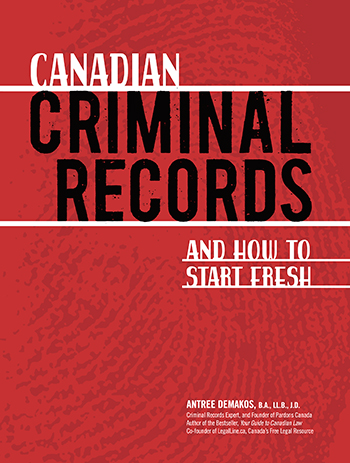
Canadian Criminal Records
and How to Start Fresh
Author Antree Demakos ISBN 9781554558759 Binding Epub Regular Publisher Fitzhenry & Whiteside eBooks Publication Date Unknown Size 0 x 0 mmIt is easy to get a criminal record. Simply being accused of a crime will lead to the police making a record of the event, even if the person is not charged. Such records, usually called incident or occurrence reports, are often disclosed in police record searches. If the police do decide to lay charges, which they will do if they have the slightest belief that the person is guilty, fingerprints and photographs are taken. Although the charge may not ultimately result in a conviction —for example, if the case is thrown out of court or the person is found innocent — much to everyone's disbelief, a criminal record still exists.
The vast majority of people with criminal records are everyday folk. They have jobs. They are mothers and fathers. They pay taxes. They look like you and me. They use 1 name, not 5 aliases. They don't own guns, and they don't 'hang out' in gangs.
In Canada 4.5 million adults (1 in 5) have been charged with a crime. More than 500,000 people are charged with a crime each year, and in 2010 more than 2 million crimes were reported by the police. It means that you, or one of your family members, a friend, a neighbour, or someone else you care about has, will acquire, or has removed a criminal record!
Antree Demakos
As Founder and General Counsel of Pardons Canada for over 20 years, Antree Demakos gained unique insight into how criminal records affect people's lives. Her hands-on experience with more than 250,000 successful record removal and U.S.A. entry applications placed Antree in a central position to analyze the numerous laws and regulations impacting criminal records. In addition to developing comprehensive procedural and training systems, she also acted as both advocate and liaison in dealing with domestic and foreign government offices, including courts, police services, the Parole Board, the RCMP, Immigration Canada, the FBI and the Department of Homeland Security.
As a lawyer, Antree recognized the public's need for access to quality legal information. As a result, in 1993 she co-founded LegalLine, Canada's FREE legal information resource. To date, LegalLine.ca has answered over 8 million enquiries.
Antree is also the author of Your Guide to Canadian Law, a 670-page bestselling reference book, now in its 5th printing.
Contents
ACKNOWLEDGMENTS
FOREWORD
Chapter One - What is a Criminal Record?
The Creation and Storage of Criminal Records
What is a Criminal Record?
Who can have a Criminal Record?
What steps are involved in creating a criminal record?
Are provincial or municipal offences included in criminal record files?
How long are criminal records kept?
Quiz
End Notes
Chapter Two - Who Can Access Criminal Records And How?
Accessing your own criminal record
What is Local Police Records Check
What is Parole Board of Canada Police Check
What is CPIC Check
What is Certified RCMP Criminal Record Report
What is Freedom of Information request
What is Vulnerable Sector Check
What is not disclosed in a Police Records Check?
Quiz
End Notes
Chapter Three - Youth Criminal Records
What is a youth criminal record?
Who creates youth criminal records, and where are they stored?
What information can be included in a youth criminal record?
How long are youth criminal records retained?
Who can access youth criminal records?
How are youth criminal records sealed or destroyed?
Do youth records created under previous laws still exist?
Quiz
End Notes
Chapter Four - How Criminal Records Affect People's Lives
Obstacles Created by Criminal Records
Employment and Education
Volunteering
Family Matters
Housing
Discrimination and Peace of Mind
Quiz
End Notes
Chapter Five - Criminal Records and Canadian Immigration
Visit | Work | Study in Canada
Legally Entering Canada with a Criminal Record
Temporary Resident Permit (TRP)
Rehabilitation Certificate (RC)
Convention Refugees
Permanent Residents
Canadian Citizenship
Quiz
End Notes
Chapter Six - Travelling to the U.S.A. with a Criminal Record
I-194 Entry Waivers
Inadmissibilty and Being Denied Entry at the Border
Crimes Involving Moral Turpitude
Effect of a Canadian Pardon or Record Suspension
U.S.A. Entry Waivers
* Eligibility
* Application
* Process
* Expiration and Renewal
* Effect of Waiver
Quiz
End Notes
Chapter Seven - Removing Criminal Records
Local Police Destructions and Purges
RCMP Destructions and Purges
Parole Board of Canada (PBC) Pardons & Record Sus